At an Arizona senior living center, a resident killed another. How the system enables violence
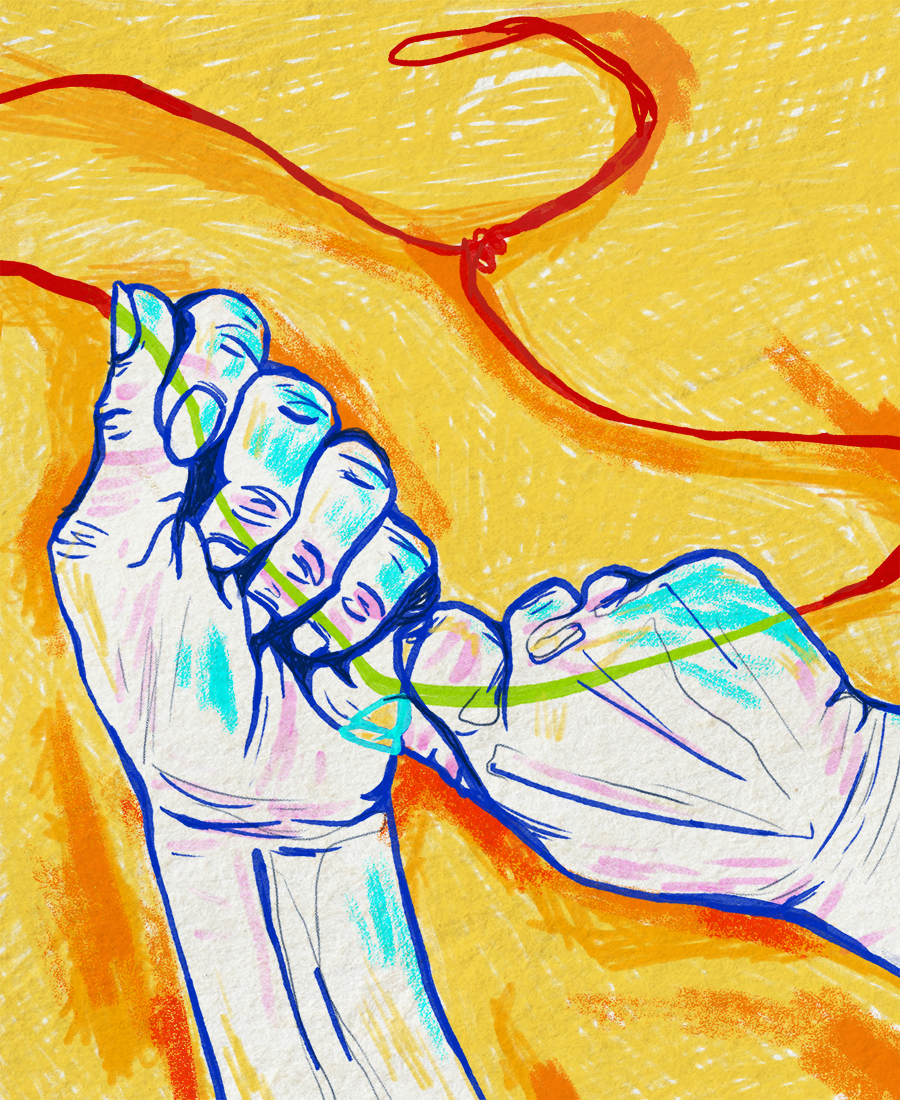
Content warning: This story contains graphic imagery and descriptions.
Two hangers.
She'd been beaten with two wire hangers.
Bernadine Wick, a 93-year-old woman with short gray hair and wire glasses, sat hunched in her wheelchair in the hall outside her room, her hands covered in blood.
Bethesda Gardens, an assisted living facility in north Phoenix with lofty ceilings, wingback chairs and a grand piano in the lobby, felt like "The Shining," as one officer put it.
Lost in dementia, Bernadine thought she’d been attacked and the blood was hers.
But it belonged to Joann Thompson, who was down the hall, her eyes filled with terror, her hair matted with blood from gashes on her head. The skin on her hand was peeled to the bone.
"Would a hanger do that?" an officer said.
In memory care units, anything can become a weapon — toilet plungers, shoehorns, electric razors, TV remotes, metal trash grabbers and walking canes.
Hundreds of vulnerable seniors, particularly those with dementia, contend with violence at the end of their lives in the very places that promise to keep them safe.
Shortages of staff — brought on by companies looking to maximize profits or stave off financial losses — lead to more harm.
For years, researchers have called on the government to track the incidents so problems can be better managed, but their calls have gone unheeded.
Arizona regulators have cozied up to the companies they govern, and state policy protects secrets instead of seniors.
The Arizona Republic spent a year chronicling life inside the state's assisted living facilities and nursing homes, interviewing residents, their families, caregivers, managers and industry experts. Reporters combed through thousands of pages of police and state regulatory reports and used the documents to build a first-of-its-kind database of resident-on-resident violence and injuries in Arizona.
The findings include:
Over the past three years, at least two residents in Arizona senior living facilities have been killed and about 20 went to the hospital after clashes with peers. At Heritage Village in Mesa, a resident pulled her roommate off her bed, peeling skin off her forearms in the process. The woman later died from avulsion — or tearing — of skin from her forearms, while also battling dementia, and lung and heart disease. Her death was ruled a homicide by the medical examiner.
Senior living facilities could do more to prevent violence. A third of the incidents were caused by residents who had previously hurt, threatened people or, according to police or staff, caused trouble before. A resident at Amber Creek Inn Memory Care in Scottsdale punched 10 residents. Employees had stopped him from instigating 30 other fights. Even so, he later knocked a resident to the ground, unconscious. Blood from his head seeped into the carpet.
As they care for patients, caregivers also get injured. A resident at Desert Highlands Care Center in Kingman beat an employee with a metal rod. A nurse at Gardens Rehab & Care Center in the same city was punched in the face and kicked in the legs as she tried to give a resident a shower.
Corporations operating assisted living facilities can keep resident-on-resident harm under wraps because regulators don't make them report incidents to their state licensing agency. Nursing homes are required to report assaults, but state citations for the issue are rare. The Republic found fewer than 50 references to residents hurting other residents in more than 1,500 citations filed about nursing homes between 2019 and 2022.
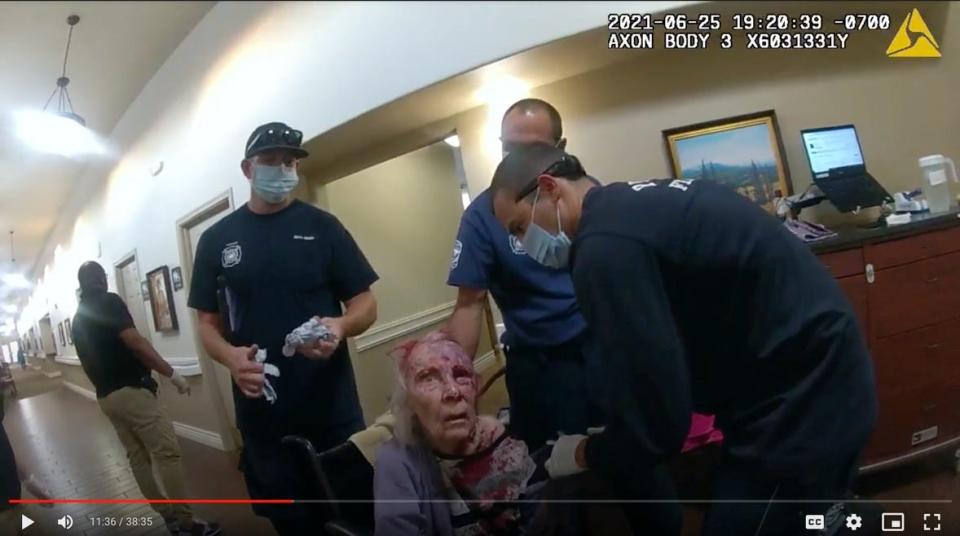
Nursing homes and assisted living facilities both provide senior care, but they serve different purposes. Nursing homes, which are federally regulated and take Medicare and Medicaid funding, are designed to provide around-the-clock medical care. They serve long-term residents with chronic, disabling conditions or people who need short-term rehabilitation after acute illnesses or injuries. There are about 140 in Arizona.
Assisted living facilities, which are state-regulated, serve as long-term homes for people who don't need constant medical attention but need varying levels of help. There are about 300 in Arizona, each serving more than 10 people.
The Republic reached out to more than 50 facilities and some of the companies that own them. Only a small percent commented. One said dementia makes some people act aggressively, but harmful interactions are rare. Another remarked that it's impossible to have employees at everyone's bedside 24 hours a day. Several said they prioritize resident safety, that staff respond to altercations immediately and that employees are trained to address behavioral issues that arise from serving challenging populations.
“You’ve got to always have your eyes on and be very observant of what’s going on to help kind of jump in and redirect,” said Chrissy Hall, the regional director of operations for Seasons Living, an assisted living facility operator with locations in Arizona. “It’s definitely challenging.”
But no matter how hard facilities and their employees try to avoid resident clashes, Hall said they cannot prevent every single bump, scratch or swipe.
“When you’re working with seniors who have cognitive impairment, their temperament, their demeanor, it changes. It can change day to day, it can change week to week, it can change hour to hour and a lot of times there is no way for you to know that it’s going to happen,” she said. “It’s just like all the sudden it’s a different person. … You can be working with somebody or observing two residents interacting and all of the sudden it can just go horribly wrong.”
Jeff Barrett with the Arizona Health Care Association said many harmful interactions can be avoided with training, consistent staff and proper safety measures.
Residents, he said, should be seen as people and not reduced to their diagnosis or behavior.
"The most important part is getting rid of the barcode on people’s foreheads," Barrett said. "When we can do that, I think we'll see a lot of change."
Until then, residents will be traumatized. Families will carry the weight of loss and regret.
"I felt very guilty about what happened to (my mom.) I felt like, I'm the one who put her there," said Cathy McDavid Mazur, Joann Thompson's daughter. "You would normally think they would be safe."
‘The little things matter’
Conflicts between residents in senior care facilities are often blamed on dementia. But contrary to common stereotypes, most people with dementia are not inherently aggressive, according to Eilon Caspi, a researcher based at the University of Connecticut, who wrote a book about conditions that lead to residents hurting one another.
Their condition causes them to misunderstand what's happening inside and around them, so they may lash out if they're in pain, need help, or if they're frightened or frustrated by their surroundings.
Neglect or inadequate care is often the real problem, Caspi said.
Experts say preventing violence starts with the admissions process, by assessing whether accepting each new resident would put others at risk.
Prevention then continues every day: Employees should understand who each resident is, what their diagnoses are and how they interact with others.
The key is to tailor a care plan to each resident's needs, equipped with activities that bring their lives a sense of purpose.
“If there’s agitation or anxiety or exit seeking, there is something triggering that,” said Kris Woolley, who founded Avista Senior Living, which operates in several states. “People don’t just wake up and say ‘I’m going to punch my neighbor.’”
Assisted living facilities commonly get in trouble for having inadequate, delayed or out-of-date plans that outline a resident's needs or for failing to follow those plans.
Over a three year period, the state cited more than 100 assisted living centers for these issues.
Bethesda Gardens was among them, even after Bernadine attacked Joann.
“The little things matter,” said Becky Hill, who serves on the state board that licenses facility managers. Her role on the board is to represent families of facility residents.
The state might just write up "little violations when Sally is mean to Jack … and then move on," Hill said. "But Sally and Jack are both miserable. Why don't we fix it for both of them?"
The Republic examined more than 200 incidents at senior living facilities from mid-2019 to mid-2022 in which residents punched, slapped, hit, pushed, kicked, poked, scratched, bit, elbowed or spat on another resident or employee, according to police and regulatory reports.
Altercations arose because one resident entered another resident’s room without permission or broke personal boundaries. Some were sexual in nature.
Clashes occurred between squabbling roommates. Others between spouses suffering from dementia.
Many were born out of the general frustrations of communal living.
A man at Mountain View Manor in Prescott hit a woman after she sneezed twice while watching television.
At Montecito Post Acute Care and Rehabilitation in Mesa, roommates argued over the placement of a bedside table and one punched the other in the face. The man who got hurt was in bed and had an endotracheal tube in his throat. He tried to hit back but couldn't reach.
In about two of every five altercations between residents reviewed by The Republic, at least one of the parties involved wound up injured. While some of the injuries were relatively superficial — a bruise, a scratch, some redness or swelling — some were serious, and residents and their caregivers were left severely shaken.
A scream. A thud.
Caregivers at Heritage Village in April 2022 ran to the source of the sounds. They found a woman knocked to the floor. The man who pushed her lay in her bed.
One of the caregivers helped the woman up and sat her near the medication cart, but the man rushed them. He hit the woman in the face several times and walked toward another resident, punching him in the head.
The two caregivers grabbed the injured woman, fled to the nearest bathroom and locked the door.
The injured woman — bleeding from her mouth and nose — trembled as her attacker tried to get in the bathroom.
"It was just two of us ladies. We couldn't really deal with him," said Margaret Ndwiga, one of the caregivers. "Maybe if we had more, or the right kind of people."
Police arrived to find the lights in the facility dimmed, the radio blaring and the man the caregivers fled from standing in the doorway.
The resident he'd punched, whose head was bleeding, stood up and tried to run away when an officer approached him. They had to convince him they meant no harm.
‘Love — and maybe a little dancing’
Cathy McDavid found herself scrambling to find a new home for her mom during the worst days of the pandemic: the spring of 2020.
The assisted living facility where Joann Thompson lived for years told McDavid they could no longer supervise her.
Joann was wandering, they said. She'd need 24-hour care. It would cost $10,000 a month.
After a stressful search, McDavid landed on Bethesda Gardens.
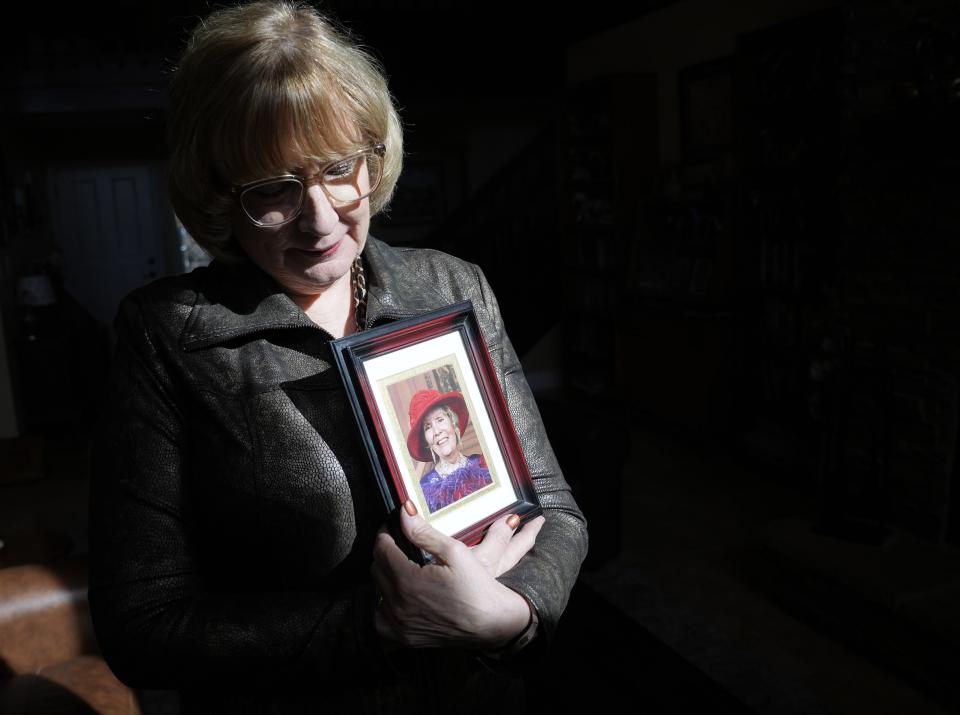
The facility's online reviews were mostly positive. Best of all, it marketed a special focus on dementia. She figured they'd know how to keep her mom safe.
At Bethesda Gardens, Joann was free to roam.
She spent her days wheeling through the halls, quietly muttering "OK, OK, OK," a tick she picked up as dementia settled in.
Joann's life was always in motion.
She was a gifted dancer and was teaching acrobatic dancing classes by the age of 14.
As she got older, she worked with her hands and her mind.
She sewed her kids' clothes. She made quilts and decorative pillows. She had a painting phase and a pottery phase. She made dollhouses and doll furniture.
She published stories and poetry in magazines.
Before Joann lost her words, her voice was broadcast on radio waves.
In her 50s, she signed up to play extras in commercials, which got her into voice-overs, leading to a long-term volunteer position reading stories on air for blind people.
Her creative outlets were "how she made life happy," McDavid said.
That wasn't easy.
Joann carried profound grief after her first love died in a car wreck. She remarried a couple of times, but her final wishes were to be buried alongside her first husband in Connecticut.
"As you grow older you can become the kind of person whose world becomes small, and you shun people and shut yourself away and that wasn't my mom for as long as she could until the dementia robbed that from her," McDavid said. "She had a large circle of friends and she was very active. Active all her life. She was somebody everybody loved."
Joann started showing signs of dementia in her mid-80s. McDavid didn't notice right away.
She recalls the times when they'd go out for a meal and her mom would tell her to pick something from the menu for her. In hindsight, McDavid thinks Joann could no longer make sense of menus and was trying to mask her symptoms.
McDavid took her "head out of the sand" when her mom's driving became dangerous.
One afternoon her mother called in a panic. She had gotten lost driving a mile and a half home from church because it had started to sprinkle. She couldn't remember how to turn on the windshield wipers.
A few months later, she drove the wrong way on Indian School Road.
"We took her keys away, and yes she cried, and yes it was bad," McDavid said. "I had to make sure she wouldn't hurt anybody."
A lesson in every violent incident
Senior living facilities could do more to prevent residents from getting into fights and hurting one another.
One in three police and regulatory reports examined by The Republic about a resident hurting someone involved residents who'd previously had trouble with staff or police or had hurt or threatened to hurt others.
Police visited Prestige Assisted Living in Sierra Vista twice in four days for the same man who was hurting his wife. On the first visit, employees tried to bring the couple breakfast but the man refused, rammed his wheelchair into his wife and hit an employee.
A caregiver told police that the man had previously thrown his wife out of her wheelchair and left her on the ground for a half hour. Another heard the woman had to go to the hospital because of something the man had done to her.
A few days later, police returned because the man hit his wife multiple times with a metal trash grabber. Nurses said the man's Alzheimer's “causes him to be violent.”
An officer noticed that the woman had old bruises. She told him she fell. When the officer asked if the facility could put the couple in separate rooms, management said there weren't any available.
When state regulators cite nursing homes for resident-on-resident harm, they sometimes find the institutions didn’t report the incident right away, didn’t thoroughly investigate what happened or didn’t have good plans for residents exhibiting patterns of distress.
Desert Haven Care Center in Phoenix got in trouble with the state in February 2022 for ignoring a doctor's orders to monitor a resident's "combative behaviors." The man, who had dementia among other ailments, kicked his roommate in the leg and punched him in the head.
The man continued to act out over the next few days, grabbing coffee cups from other residents and pouring the contents into his own cup; snatching food off their plates at mealtime; cursing at staff; and hurling a bedside table at a caregiver.
"We've created conditions for (residents) to fail, and then we're saying they're aggressive," Caspi said, later adding: "We need to look at the behaviors of the providers."
No matter the severity or the issue that triggered the harm, facilities are responsible for keeping all their residents safe.
Confrontation can traumatize residents.
A Scottsdale Village Square woman awoke at night to her neighbor striking her legs with his cane.
The woman wept afterward, saying she didn't want to return to her room because she didn't feel safe anymore.
When an officer tried to question the man, he screamed and threatened the officer. The officer wrote that he thought he might have to use force to stop the man.
The resident "is 71-years-old, small in stature and partially blind, so I did not feel threatened but it was apparent that he did not have a problem using aggression and physical force when he was angry," the officer wrote. "An elderly, physically frail or vulnerable person would be justifiably frightened at the behavior I experienced."
Caspi said facilities need to learn from every incident – even near misses – or else they’re greenlighting incidents to escalate.
"If you walk by a resident who hits another resident, it looks like aggression," Caspi said. "But if you sit there for two hours prior and you see what happened before that, and you see the indignities, the lack of care, and the lack of meeting their emotional needs and psychological needs, and social needs, and lack of purpose and their medical needs, you see that they're trying to preserve their dignity."
Reliving childhood abuse
Cathy McDavid is haunted by what-ifs. Would her mom be fine today if the facility had responded to Bernadine Wick differently?
Bethesda Gardens employees had struggled to care for Bernadine before Joann moved in.
In 2019, an employee emailed the facility director and the memory care unit director saying Bernadine's daughter wanted a lock for her mother's door and was upset that "random women" wandered into her room even when the door was shut, according to court records.
The employee told her superiors that it "wasn’t working out." She questioned whether Bethesda Gardens was right for Bernadine.
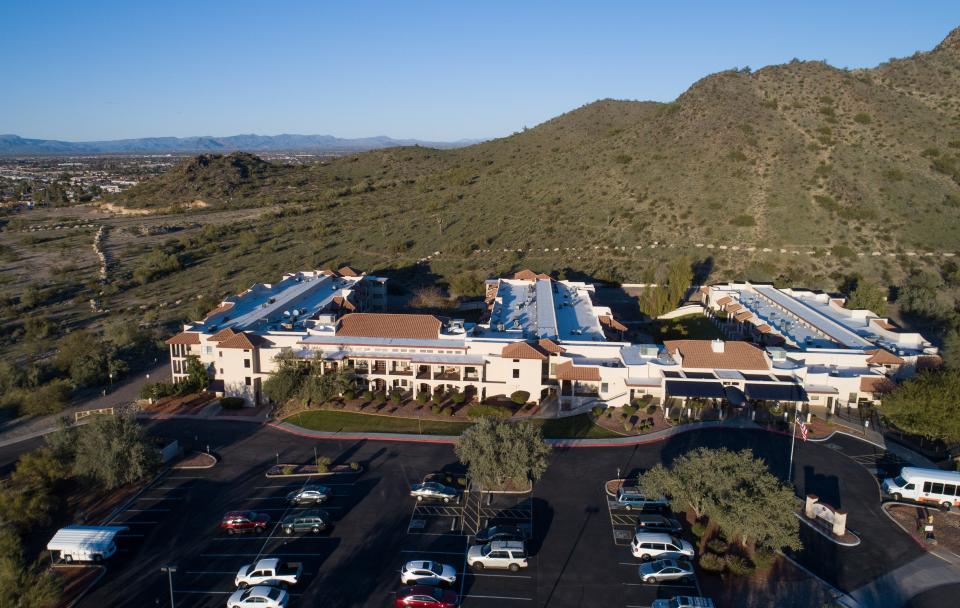
Bernadine's personal service plan stated that she didn't like to be touched by staff, was disoriented and confused and was usually agitated or combative.
Records from Feb. 8, 2021, indicated that Bernadine bit a resident who wandered into her room and crawled atop her bed. The next month, she stabbed a person in the dining room with a fork.
And in May, Bernadine bit another resident on the arm and punched them twice in the face.
Staff tried to maintain Bernadine's privacy by monitoring the wandering residents and keeping them out of her space, according to court records.
Dementia or trauma-related conditions can cause people to misinterpret what’s going on around them or relive distressing memories.
Bernadine's daughter told police her mother was abused as a child.
She said the psychiatrist who conducted her mother's memory test told her that Bernadine had the worst case of post-traumatic stress disorder they had seen in a senior.
Bernadine would call her daughter saying that her belongings had been stolen or that she'd been kidnapped and was tied up.
"I'm in a dark cave and I don't know where I am," she'd tell her daughter. "Come get me."
Bernadine's daughter didn't know about her mother's trauma until adulthood: Her mother had put her energy into her faith, family and career.
Bernadine played drums for a Drum and Bugle Corps in her late teens with her brothers. Her cadence was so perfect that she took the lead: The whole unit had to line up with Bernadine's marching steps.
She also taught baton twirling, a skill she passed on to her daughter.
Bernadine was a determined woman. She taught herself how to use a computer for a groundwater pollution consultant job in the 1970s — long before most people used computers.
She also found joy in hobbies. She was on a bowling team. She was a fearless camper. Her daughter vividly remembers standing on a cot to avoid the centipedes invading their tent while her mom fought them off with a shovel.
Bernadine taught herself to sew and knit and she donated her blankets to organizations that supported veterans and children.
Bernadine started showing signs of dementia in her 80s. The search for an assisted living facility started after the family discovered she had maxed out her credit cards buying whatever she saw on infomercials.
At Bethesda Gardens, Bernadine may have been protected from scams but not sickness or injury.
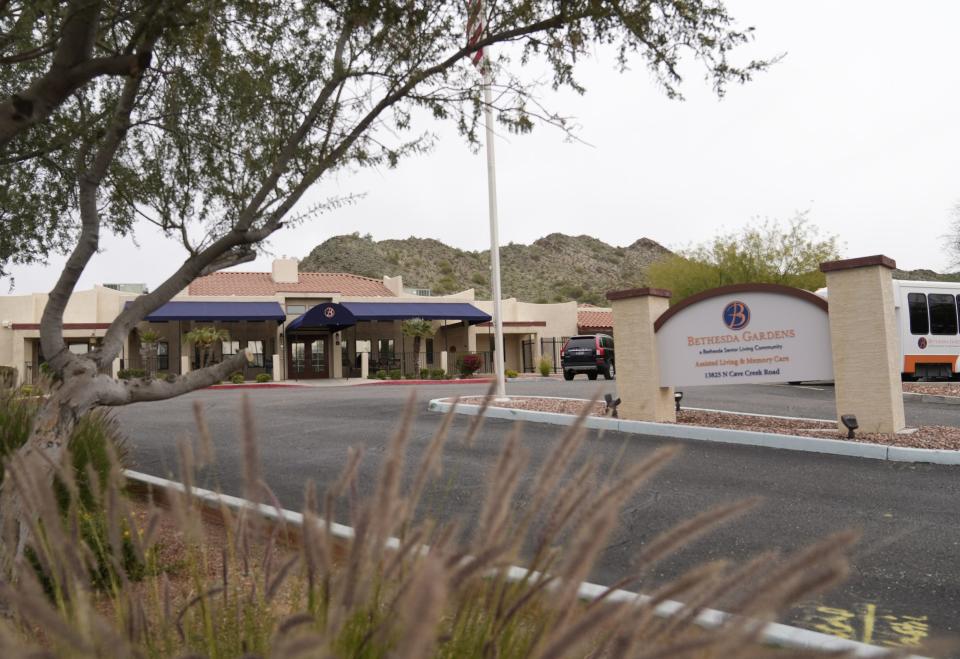
Her daughter said she fell several times and hit her head on the floor — possibly sustaining a concussion — in the weeks leading up to her clash with Joann.
At the hospital after the incident, a doctor found infections in her legs and her bladder so advanced they had to have raged for months, her daughter said.
On June 25, 2021, anyone who came near would have seemed like a threat.
Even Joann, who was 90 and just shy of 120 pounds, with a vocabulary limited to "OK" and "I love you, too," which was reserved for her daughter.
If it’s not tracked, it doesn’t exist
The Arizona Department of Health Services licenses facilities and is responsible for investigating complaints.
But assisted living facilities are not required to file a report with the agency for nonfatal resident injuries.
That's not normal. Most states require facilities to report to their licensing agency when residents get hurt, according to a Republic review of state laws.
"(Assaults) absolutely get swept under the carpet," said McDavid, Joann Thompson's daughter. "There should be some kind of report card that these people have to put out there."
Such resources exist in other states: In Colorado, consumers can search a government dashboard to learn about incidents reported at each assisted living facility in the state.
"If I'm looking for a facility for my loved one and I'm doing my research, I want to know were there incidences there," McDavid said. "I now realize there are incidences. I didn't know this before when I was looking for a place for my mom. I didn't see any reviews that said, 'My loved one got punched by another resident.'"
Out of hundreds of reports, The Republic found only three assisted living center citations that mentioned specific resident-on-resident altercations and two others that indicated facilities had no policy or procedures addressing how caregivers should respond to sudden resident outbursts.
For example, Amber Creek Inn Memory Care in Scottsdale — where one resident punched 10 residents before knocking one unconscious — had no citations referencing that incident. An employee had told police the facility was not equipped to care for the man.
Nor is there a state report documenting what happened at Heritage Village when a resident knocked over a woman in a wheelchair, scared employees into locking themselves in a bathroom and petrified another resident in the common area.
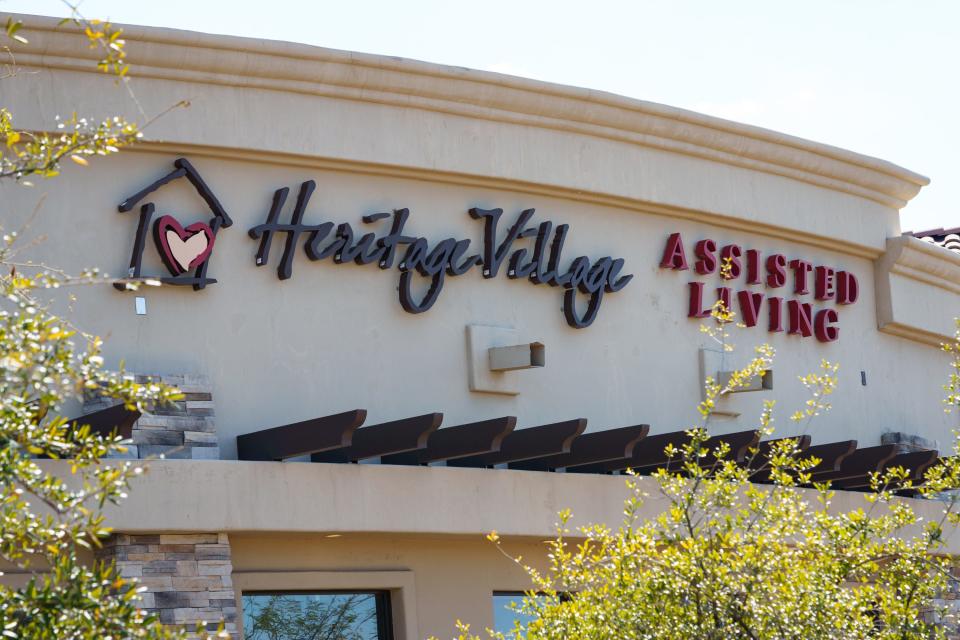
The Health Department's communication team did not respond to several emails about those two incidents. They also did not reply when asked if anyone filed a complaint about what happened to Joann and Bernadine at Bethesda Gardens or if there was an ongoing investigation.
Essentially, if no one files a complaint to the Health Department management can avoid accountability.
In November 2019, an employee at Powell Place in Payson called the police and said one resident had fallen and broken his hip and staff didn't call 911. She said another resident had bed sores and nurses refused to take her to the hospital. A third resident, she told police, fell into a pool of her own vomit several times and died three days later.
The employee reported this to the administration but they said "no one can know,” the police notes stated.
And it appears no one else did. There are no records of any complaint or any investigation into these allegations in state Health Department records.
Nursing homes, which are federally regulated, must report resident injuries — but little attention is paid to harmful incidents between residents.
"It's not being tracked, so for all practical purposes, it doesn't exist," said Caspi, the researcher who has studied the issue for years. "And if it doesn't exist, you don't have to do anything about it."
The Republic found about 50 resident-on-resident harm cases after scouring Health Department deficiency reports.
"I don't want to speculate on that," said Tom Salow, one of the top regulators at the state Health Department.
The Arizona Auditor General has slammed the Arizona Department of Health Services twice in the past several years for neglecting complaints about nursing homes.
A 2019 audit found that the state Health Department either took too long to investigate complaints or didn't investigate them at all.
At the time, Director Cara Christ said that monitoring nursing homes represented a small fraction of what the department does, and the auditor reviewed a "narrow, non-representative sample" anyway. In 2021, Christ left her post to work for Blue Cross Blue Shield Arizona.
Last spring, the auditor general reported that the Arizona Department of Health Services had not resolved problems spotted in 2019 — and even made matters worse by closing most severe abuse and neglect reports without the required on-site investigations.
Salow said the second report prompted a "culture change" on the team that surveys nursing homes.
Staff has since significantly reduced the backlog for annual inspections, responded to most severe complaints within days and reopened cases that shouldn't have been outright dismissed, he said.
Still, Salow said, the team is struggling with turnover; training inspectors takes six months to a year.
"There's still a lot more that we can do, and that we will do, to protect those residents," Salow said.
‘I will never forget that sight of her’
Cathy McDavid had no idea her mother was in danger at Bethesda Gardens.
She anticipated the dreaded phone call. The one where they'd tell her that her mother's health was tanking and she'd better get there to say goodbye.
She never would have imagined the phone call she received instead.
It came at about 7:30 p.m. on a Friday. The memory care unit director, Brian Cruz, was on the line.
Joann had "blood on her face" and "as a precaution" she was taken to a hospital.
When McDavid got to the hospital, a nurse stopped her in the hallway and asked her if she'd heard what happened.
McDavid had no idea.
"She goes: 'Your mom was attacked by a fellow resident.' And I said, 'Attacked?' And in that second we turned into the room. That was all the warning I had. And I look at my mom lying on that gurney and it's like someone took a flipping ice pick to her face," McDavid said. "I was knocked to my knees. I will never forget that sight of her. She had bandages around her head, bloody face, wires everywhere."
The nurse asked McDavid if the police had talked to her.
No. No one had talked to her.
A doctor came into the room and told McDavid to prepare for the end. He told her it was very hard for people Joann's age, with dementia, to come back from physical trauma.
McDavid texted Cruz, the memory care director.
"I said, 'This is really serious. My mom's hurt badly," McDavid said. "And within minutes, I had a call from the executive director of Bethesda Gardens. And that's when she explained to me what I felt I should have been told right from the start."
The next morning, Joann had skin graft surgery to spare her the excruciating pain of wound cleaning every few hours.
Joann never roused.
McDavid moved her to a hospice facility, where she waited, hand-in-hand, for death to take her mother.
Six days.
Joann Thompson died July 2, 2021.
‘I thought we were going to end up in the media’
Arizona lawmakers and regulators have prioritized the needs of assisted living and nursing home companies over the seniors who live inside.
At least 17 states require assisted living facilities to get inspected about once a year, with a few even requiring two inspections per year.
Not Arizona.
State law prohibits surveyors from returning to a facility for at least two years after an error-free inspection, unless they receive a complaint about the place.
Salow said that’s not enough.
“If you’re on site at a facility within 12 months they tend to be in better compliance,” he said.
Regulators also have gone out of their way to protect companies by denying requests for information from the media.
During the early days of the pandemic, the state Health Department refused to provide The Republic with a list of facilities where COVID-19 outbreaks had occurred.
The Republic sued.
The Arizona Department of Health Services argued in court that sharing the data would be bad for business. To make its point, the agency cited Hacienda HealthCare’s struggle with negative publicity after a nurse was accused of raping and impregnating an incapacitated patient.

"Because of publicity ... multiple directors of nursing homes resigned, and Hacienda experienced significant turnover among middle and upper management," the state said. "These issues threatened the facility's viability, caused significant problems obtaining adequate insurance, and eventually forced Hacienda to close the skilled nursing portion of its operation due to financial problems."
Then there’s the board that licenses nursing home and assisted living facility managers. It only exists today because industry executives urged the state Legislature to keep it operating.
Former Gov. Doug Ducey disbanded the board after a 2021 Republic investigation exposed its members for overlooking problems that put seniors at risk.
In addition to the Republic’s reporting, Ducey’s office found the board had dismissed cases — for "insufficient evidence" — against 30 people who collectively racked up 400 deficiencies cited by state health inspectors, including one case with 86 citations.
But the Legislature restored the board’s power, backed by a 10-8 vote by a study committee that included one man whose brother was on the board at the time and is currently the board’s president.
Only three members from the pre-reform days remain.
Jack Confer, the board’s executive director, said he doesn’t know how often resident-on-resident harm cases come up during board meetings. He said he has no clear way to track them because the board’s system is not designed to flag cases where residents hurt each other.
In December 2022, the board investigated Ginger Hanlon, who was the executive director of Bethesda Gardens when Joann died. But the investigation had nothing to do with Joann’s death – it was about hiring people without verifying whether they were qualified for the job.
Hanlon, who no longer worked at Bethesda Gardens when she went before the board, argued that Bethesda Gardens had all the proper documents but the inspector didn’t ask for the right ones. She also expressed disdain that the inspector had taken so many photographs during the visit.
Although the state Health Department had already fined Bethesda Gardens $1,750 for its violations, the board dismissed the case against her.
Another case — about a woman who was sexually assaulted at La Estancia Health Nursing and Rehabilitation Center — was one of the few The Republic found involving resident-on-resident harm, and it was treated lightly by board members.
One told Christopher Daroczy, the administrator of La Estancia at the time, that he was surprised his hair hadn't gone white.
Fellow board members chuckled.
"It was a challenging time," Daroczy admitted. "I thought we were going to end up in the media."
The board dismissed the complaint unanimously.
But what actually happened to the woman at La Estancia — how she was fondled in a courtyard by a fellow resident — was barely discussed.
The man turned out to have a history, according to a state report. Just a few weeks prior to the assault, staff had found him in a female resident's room watching her sleep. He was shooed away, only to return the next night to ask the resident if he could enter. Despite her refusal, he let himself in while she was sleeping.
The psychiatrist who wrote the man's evaluation told a state inspector that he didn't think the man posed a danger to other residents, but his report indicated the man had "displayed daily inappropriate sexual behavior with verbal suggestions and touching others."
The man still ended up unsupervised after midnight in the courtyard with a resident who was haunted by having been raped when she was younger. She feared men and suffered from delusions stemming from her abuse.
A nursing assistant found the man with his hand down the woman's pants. The man said he was sorry and wouldn't do it again.
The state report said the woman he groped "looked helpless, as though she had been forced to do something."
When contacted by the Republic, Daroczy said there was no way to predict what happened in the courtyard. He emphasized that the psychiatrist who wrote the man’s evaluation didn’t raise an alarm about him.
He said the facility did everything right: the residents were immediately separated and the man was no longer allowed to live there. The facility did a root-cause investigation and staff got additional training throughout the year, he said.
Daroczy added that the board thoroughly investigated his case prior to the meeting.
The hair color comment, he said, reflected board members’ understanding of how difficult the situation was for him, since some board members are administrators or managers themselves.
‘Oh my God, she is all bloody’
When Joann wheeled into Bernadine's room, the hall monitor had just stepped away from his post to get some water.
Moments later, he heard yelling and rushed to Bernadine’s room. The door was closed.
The entrance to the room was a narrow alcove, just enough space for two people in wheelchairs to get stuck. When the employee tried to pry the door open, he couldn't. Joann’s wheelchair had blocked it from the other side.
The employee flagged a coworker for help and together they pushed the door open to pull Joann out.
By that time, Joann's blood was splattered against the wall and carpet. Skin on her hand had peeled off, exposing bone. Her scalp was cut up.
Cruz, the memory care director, happened to be on the phone with an employee when he overheard someone in the background calling for help. He asked what was happening and was told, "Oh my God she is all bloody."
Cruz told the employee to call 911.
A caregiver applied pressure to Joann's head, trying to stop the bleeding while they waited for the emergency medical team.
What happened next, captured on police body camera footage, exposed just how unprepared Bethesda Gardens was to manage a crisis.
It took 20 minutes for employees to provide officers with documentation identifying Joann and Bernadine.
"This is terrible," one officer remarked as they waited. "They don’t know if she’s on blood thinners, or what medications, it could be life-threatening."
Bernadine sat alone down the hallway, staring at the floor, a piece of Joann’s skin in her lap.
When paramedics approached her, she told them that her hip joint hurt.
"I don’t know why they're not here cleaning her up," one officer said.
"Yeah, like, why isn't there a staff member with her right now," the other responded.
After an employee finally handed an officer a printout identifying Joann and Bernadine, he told another employee she ought to call the power of attorney for the two women.
The employee fell silent.
"I would," the officer said. "They should know that one went to the hospital and the other just beat someone up with a hanger. I would do that."
"I don't know," the employee replied. "I can ask my boss what the procedure is, if you don't mind."
Caitlin.Mcglade@arizonarepublic.com, Melina.Walling@azcentral.com, sjayaraman@gannett.com
This article originally appeared on Arizona Republic: Arizonans in senior living facilities face violence from other residents

